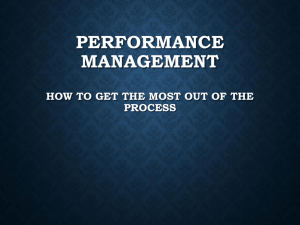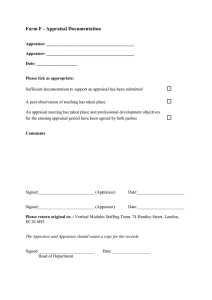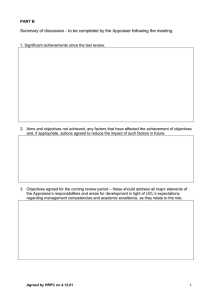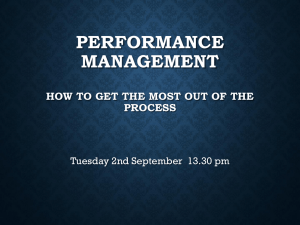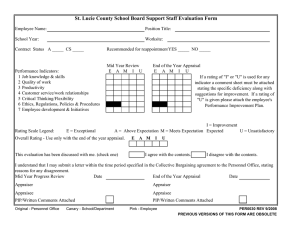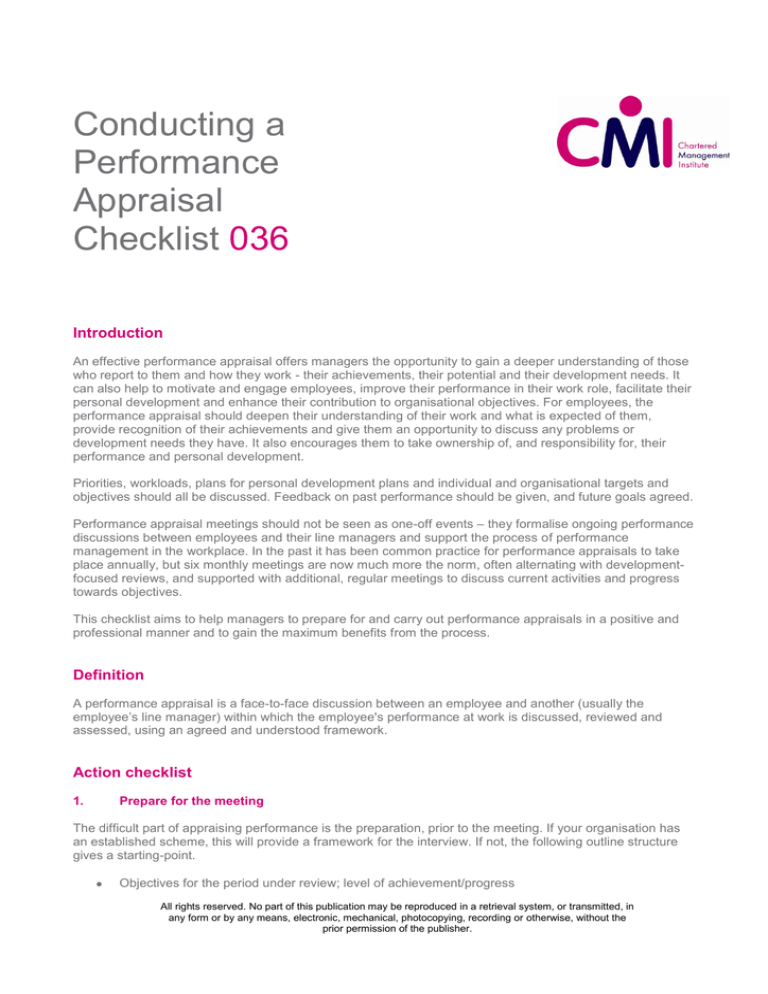
Conducting a
Performance
Appraisal
Checklist 036
Introduction
An effective performance appraisal offers managers the opportunity to gain a deeper understanding of those
who report to them and how they work - their achievements, their potential and their development needs. It
can also help to motivate and engage employees, improve their performance in their work role, facilitate their
personal development and enhance their contribution to organisational objectives. For employees, the
performance appraisal should deepen their understanding of their work and what is expected of them,
provide recognition of their achievements and give them an opportunity to discuss any problems or
development needs they have. It also encourages them to take ownership of, and responsibility for, their
performance and personal development.
Priorities, workloads, plans for personal development plans and individual and organisational targets and
objectives should all be discussed. Feedback on past performance should be given, and future goals agreed.
Performance appraisal meetings should not be seen as one-off events – they formalise ongoing performance
discussions between employees and their line managers and support the process of performance
management in the workplace. In the past it has been common practice for performance appraisals to take
place annually, but six monthly meetings are now much more the norm, often alternating with developmentfocused reviews, and supported with additional, regular meetings to discuss current activities and progress
towards objectives.
This checklist aims to help managers to prepare for and carry out performance appraisals in a positive and
professional manner and to gain the maximum benefits from the process.
Definition
A performance appraisal is a face-to-face discussion between an employee and another (usually the
employee’s line manager) within which the employee's performance at work is discussed, reviewed and
assessed, using an agreed and understood framework.
Action checklist
1.
Prepare for the meeting
The difficult part of appraising performance is the preparation, prior to the meeting. If your organisation has
an established scheme, this will provide a framework for the interview. If not, the following outline structure
gives a starting-point.
Objectives for the period under review; level of achievement/progress
All rights reserved. No part of this publication may be reproduced in a retrieval system, or transmitted, in
any form or by any means, electronic, mechanical, photocopying, recording or otherwise, without the
prior permission of the publisher.
Continuing or unresolved problems during this period
Evaluation of any development activity during this period
Objectives for next review period
Support required in order to achieve these objectives
Personal development objectives - these may vary from the above, or provide a means to their
attainment
Any issues of major importance or concern relating to the forthcoming review period.
Gather your thoughts, information and evidence and fit these into the framework. This will help to steer the
discussion.
2.
Arrange for the appraisal discussion
Before the interview make sure that the appraisee understands the purpose and aims of the appraisal.
Advise the appraisee how to prepare in advance - e.g., by identifying strengths, achievements,
weaknesses or failures, over the past year
Ask the appraisee to prepare an assessment of how well the last objectives were achieved, and
consider what the next year’s objectives should be
Ask the appraisee to reflect on the value and practical application of any training or development
activities undertaken during the past year
Explain that this is an opportunity to turn over problems, and discuss and agree work directions and
methods for the next year
If the appraisal is linked to pay or promotion, explain how this works
Introduce any necessary documentation and forms that will be used
Agree the time and place for the discussion.
3.
Prepare the environment
The environment for the discussion should be informal, friendly, comfortable, and completely private and
confidential. Avoid sitting the appraisee in front of your desk, as this could form a barrier: instead, arrange
your chairs so that you can communicate easily. Avoid interruptions, and divert or switch off your telephone.
4.
Use the consultative approach
It is important to be conversational but positive, discussing specific activities and issues. Focus on looking
forward to improvements, ask open questions and listen attentively to what is said. Reflect back what you
hear and respond appropriately. Coaching skills will be helpful here. (See Related checklists below).
5.
Start the discussion
At the start of the discussion, it is important to relax the appraisee. There is no formula for this, but
respectfulness and tact are always important. Otherwise, gauge the required level of formality and the
admissibility of relaxing banter or conversation from how well you know and work with the appraisee.
re-state the meeting’s purpose and structure
emphasise the aim of supporting the appraisee’s development
re-state the reasons for using documentation (it gives a record of the meeting and its contents, and a
base for measuring progress).
6.
Develop the discussion
In theory, and with good preparation by both parties, discussion should follow the framework outlined. To try
to keep it on track, the appraiser should:
encourage - but not lead - self-assessment and diagnosis
maintain and build the appraisee's self-esteem, where appropriate
offer help and suggestions, but let the appraisee arrive at solutions
concentrate on job performance and not discuss personalities
discuss specific examples and not make general comments or criticisms
All rights reserved. No part of this publication may be reproduced in a retrieval system, or transmitted, in
any form or by any means, electronic, mechanical, photocopying, recording or otherwise, without the
prior permission of the publisher.
summarise the discussions at critical or agreed action points
give guidance on, and reach agreement about, goals and plans.
7.
Deal with difficulties and focus on improvements
If ongoing conversations and discussions have been taking place, there should be no surprises at this stage.
If, however, there is a need to address poor performance, focus on the need for improvement and discuss
what the appraisee how and when improvements might be made, and what support might be needed to help
achieve them. If appropriate, be prepared to admit that you - as appraiser - might be a cause of problems
yourself, or could do more to help the appraisee. If there is disagreement stay calm but firm. Try to focus on
the available evidence and be prepared to consider carefully any counter-evidence presented by the
appraisee. Avoid arguing and listen attentively, taking care to separate facts from feelings. Remember the
focus should stay on what the job-holder does, not on the job-holder.
8.
Agree areas for improvement
Try to distinguish areas that need remedial attention from those that are developmental. Agree preferred
training outcomes and development activities, and encourage the appraisee to identify ways to achieve
these. If encouragement is not successful, then try steering and guidance, using instruction only as a last
resort. Remember there are many types of training activity, so a standard, public, two-day course is not
always the most efficient or appropriate option.
9.
Rate the performance
Some appraisal schemes use performance ratings. These can vary in nature and scope and can be useful or
destructive, depending on how the rating is done and generally understood. Ratings can be detrimental if
they are not:
fair - reflecting performance against expectations, not other people
honest - respecting what the individual has to say
flexible - reflecting the level and extent of individuals' achievements
consistent - across different sectors of the organisation.
10.
Close the discussion
Ensure you have reached and agreed a mutual understanding of the appraisee’s objectives, how they will be
achieved and the target or review dates. Agree who is doing what to set up these activities and set a date for
follow-up. Ensure that you or the employee write up the objectives and plans, preferably on a form used
across the organisation, so that both of you can sign it off. End on a positive note.
Managers should avoid:
criticizing the appraisee’s personality
falling into the pitfall of recency, where performance over the whole period is based on a recent
incident
allowing personal prejudice to label the appraisee as good or bad (halo or horns effect)
using closed, rhetorical questions
talking rather than listening (A recommended ratio would be 70% listening to 30% talking.)
letting the conversation to become one-sided
allowing fear to lead to a good review rather than an truthful one
ignoring job-holders’ views and thoughts
planning action without first reaching agreement on what is needed.
National Occupational Standards for Management and Leadership
This checklist has relevance to the following standards:
D: Working with people, units 5, 6
All rights reserved. No part of this publication may be reproduced in a retrieval system, or transmitted, in
any form or by any means, electronic, mechanical, photocopying, recording or otherwise, without the
prior permission of the publisher.
Additional resources
Books
Performance management
IDS HR Studies, no 988, 2011
Appraisal feedback and development: making performance review work, 4th ed, Clive Fletcher
Abingdon: Routledge, 2008
Ready to use performance appraisals: downloadable customizable tools for better faster reviews,
William S Swan
Hoboken NJ: John Wiley, 2007
This is a selection of books available for loan to members from CMI’s library. More information at:
www.managers.org.uk/library
Related checklists
Using 360 Degree Feedback (074)
Performance Management (180)
Giving feedback as a coach (222)
Giving criticism as a coach (223)
Internet resources
Businessballs.com: www.Businessballs.com/performanceappraisals.htm
Information on performance appraisals and performance evaluation, including free forms, tips, etc.
CMI members can access step by step guides and templates for performance appraisal and performance
management from the BusinessHR service at www.managers.org.uk/businesshr. Look in the Training and
Development section.
This is one of many checklists available to all CMI members. For more information please contact
t: 01536 204222
e: enquiries@managers.org.uk
w: www.managers.org.uk
Chartered Management Institute
Management House, Cottingham Road, Corby NN17 1TT.
This publication is for general guidance only. The publisher and expert contributors disclaim all liability for
any errors or omissions. You should make appropriate inquiries and seek appropriate advice before making
any business, legal or other decisions. Where legal or regulatory frameworks or references are mentioned
these relate to the UK only.
Revised May 2011
All rights reserved. No part of this publication may be reproduced in a retrieval system, or transmitted, in
any form or by any means, electronic, mechanical, photocopying, recording or otherwise, without the
prior permission of the publisher.

